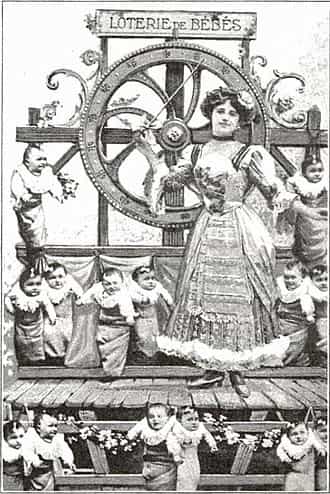Baby Lottery of Paris: A Strange Raffle in History

In 1911, something unusual happened in Paris. A raffle called the Loterie de Bébés, or Baby Lottery, took place, where the prizes were not money or goods—but actual babies!
This unusual event happened at a time when life was very tough for many children in France, especially orphans. While this idea may sound shocking today, understanding the historical background helps explain why it happened.
Life Was Hard for Orphans in France
Between 1805 and 1923, French laws only allowed adults to be adopted. Children, especially orphans or babies abandoned by their parents, had very few options for a good life. They were often left in poorly funded orphanages or hospitals, where conditions were harsh.
In these places, children didn’t get proper care, education, or even love. They had very little to call their own—no toys, nice clothes, or meaningful possessions. Emotional support was nearly non-existent. As a result, many children didn’t survive, and those who did often had bleak futures.
By the time they reached adulthood, most orphans had very few skills to help them live independently. For example:
Girls were usually trained to work as servants for wealthy families.
Boys were taught simple tasks, such as basic manual labor, so they could become apprentices.
Even though these orphanages weren’t ideal, they were still better than the other option—workhouses. In workhouses, children had to work long hours in factories, often doing dangerous jobs. They lived in overcrowded spaces, fought over food, and slept in crammed beds shared with other kids.
Why a Baby Lottery?
The idea of the Baby Lottery might seem shocking today, but the people behind it believed they were doing something good. The authorities approved the lottery, which was designed to benefit both orphans and childless couples.
Here’s how it worked:
- Couples who couldn’t have children could enter the raffle for a chance to adopt a baby.
- The money raised from ticket sales was donated to children’s charities and orphanages.
- Orphanages hoped to reduce overcrowding by finding homes for some of their children.
The organizers thought this was a win-win situation. Babies would (hopefully) go to loving homes, couples who wanted children would have their wish granted, and the orphanages would get much-needed financial help to care for other kids.
What Were the Intentions Behind the Lottery?
While the concept of a baby lottery may sound cruel or unethical today, it’s important to understand the context of that time.
In 1911, the people organizing the raffle believed they were solving multiple problems:
Providing Homes for Orphans: Many orphans had no chance of being adopted due to strict laws. This raffle gave them a chance at a better life.
Helping Childless Couples: Infertile couples, who had no way to adopt otherwise, could finally become parents.
Raising Money for Charity: All the funds from the raffle were promised to orphanages and charities that supported children.
Reducing Overcrowding in Orphanages: By finding homes for babies, orphanages could free up space for other children in need.
How Did Society React?
At the time, many people saw the lottery as a creative and helpful idea. It was supported by the authorities and seen as a practical way to address the challenges faced by orphans and orphanages.
However, not everyone agreed. Some people felt uncomfortable about the idea of treating babies as “prizes.” They worried about whether the couples who won the raffle would truly provide a good home for the child.
Still, many believed the organizers had good intentions. They were trying to improve the lives of children who were living in very difficult conditions.
Looking Back at the Baby Lottery
Today, the idea of a baby lottery would be considered unethical and unacceptable. Modern adoption laws are designed to carefully match children with families who can provide safe, loving homes. There are strict checks to ensure that adoptive parents are suitable.
But in 1911, things were very different. Orphanages were overcrowded, and many children faced neglect and suffering. The Baby Lottery was an attempt to solve these problems, even if the method seems shocking by today’s standards.
The Baby Lottery reminds us how much attitudes toward children and adoption have changed over time. It shows how society has grown to value the rights and well-being of children.
Back then, children in orphanages were often seen as a burden on society. Today, we understand that every child deserves care, love, and respect. Modern systems focus on ensuring that children grow up in safe and supportive environments.
The Loterie de Bébés is a strange and fascinating chapter in history. While the idea of raffling off babies might seem horrifying now, it reflected the challenges of the time and the limited options available for orphans and childless couples.
Although the lottery’s intentions were good, it also raises important ethical questions. Looking back, we can learn from these mistakes and appreciate the progress made in child welfare and adoption practices over the past century.
This unusual event reminds us of how far we’ve come in ensuring that every child has the chance for a better life.
FAQ: The Baby Lottery of Paris
1. What was the Baby Lottery?
The Baby Lottery, or Loterie de Bébés, was a raffle held in Paris in 1911 where the prizes were babies. It allowed childless couples to “win” a baby to adopt while raising money for orphanages and children’s charities.
2. Why was the Baby Lottery created?
The lottery was organized to address multiple problems:
- To help overcrowded orphanages by finding homes for children.
- To provide childless couples with the opportunity to have a baby.
- To raise money for charities and orphanages that cared for orphans.
3. Was it legal to raffle off babies?
Yes, at the time, the authorities approved the Baby Lottery. It was considered a practical solution to social issues related to orphan care and adoption.
4. Why couldn’t children in France be adopted normally?
Between 1805 and 1923, French law only allowed the adoption of adults, and even that was under strict conditions. This left many orphans without the possibility of being adopted into loving families.
5. What were orphanages like during this time?
Orphanages in France during the 19th and early 20th centuries were underfunded and poorly managed. Children received little care, education, or affection. Many struggled to survive and lacked the skills needed for a good future.
6. How did the raffle work?
Childless couples could buy tickets to enter the lottery. Winners were given the opportunity to adopt a baby. The money raised from ticket sales was donated to orphanages and children’s charities.
7. How did people feel about the Baby Lottery?
At the time, many people supported the idea because it helped children and gave childless couples a chance to become parents. However, some criticized the concept, feeling it was unethical to treat babies as prizes in a raffle.
8. What were the intentions behind the lottery?
The organizers wanted to:
- Find homes for orphans.
- Help couples who couldn’t have children.
- Raise funds for children’s charities.
- Reduce overcrowding in orphanages.
9. Why is the Baby Lottery controversial today?
Modern views on ethics and child welfare consider the idea of raffling off babies unacceptable. Children are now seen as individuals with rights, and strict adoption processes are in place to ensure their safety and well-being.
10. What can we learn from the Baby Lottery?
The Baby Lottery highlights how society’s attitudes toward children and adoption have changed over time. It reminds us of the importance of ensuring every child has the right to a safe, loving, and supportive home.
11. Did the Baby Lottery succeed in its goals?
While the lottery helped some children find homes and raised money for charity, it also raised concerns about whether the winning couples were fit to adopt. The ethical questions surrounding the event remain a significant part of its legacy.
12. Could something like the Baby Lottery happen today?
No. Modern laws and ethics prioritize the rights and well-being of children. Adoption processes are now highly regulated to ensure that children are placed in safe, nurturing homes.
